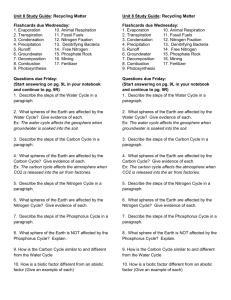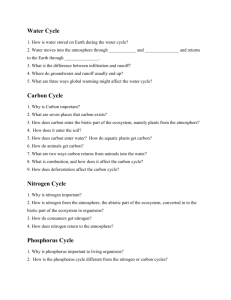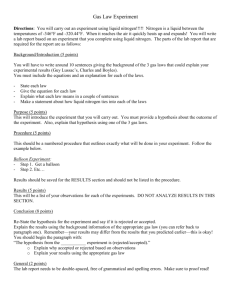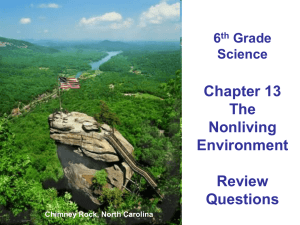Unit 8 Study Guide: Nutrient Cycles Flashcards due Wednesday: 1
advertisement
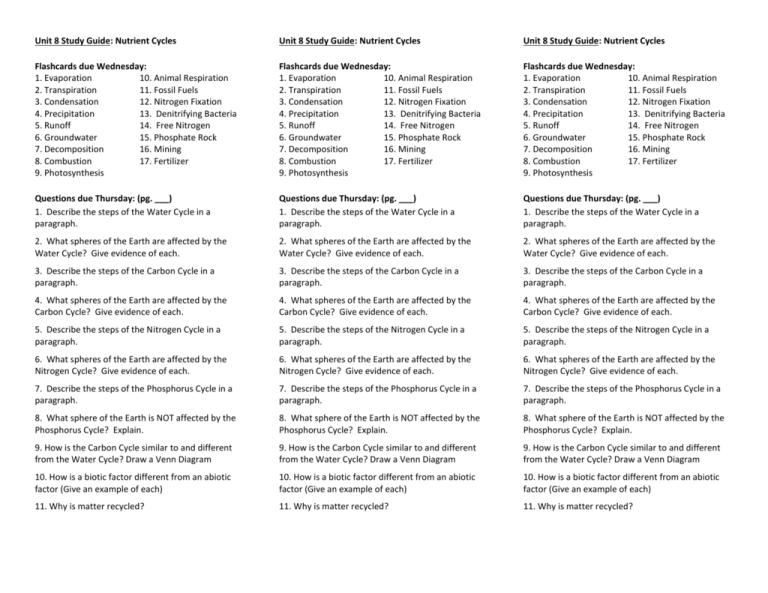
Unit 8 Study Guide: Nutrient Cycles Unit 8 Study Guide: Nutrient Cycles Unit 8 Study Guide: Nutrient Cycles Flashcards due Wednesday: 1. Evaporation 10. Animal Respiration 2. Transpiration 11. Fossil Fuels 3. Condensation 12. Nitrogen Fixation 4. Precipitation 13. Denitrifying Bacteria 5. Runoff 14. Free Nitrogen 6. Groundwater 15. Phosphate Rock 7. Decomposition 16. Mining 8. Combustion 17. Fertilizer 9. Photosynthesis Flashcards due Wednesday: 1. Evaporation 10. Animal Respiration 2. Transpiration 11. Fossil Fuels 3. Condensation 12. Nitrogen Fixation 4. Precipitation 13. Denitrifying Bacteria 5. Runoff 14. Free Nitrogen 6. Groundwater 15. Phosphate Rock 7. Decomposition 16. Mining 8. Combustion 17. Fertilizer 9. Photosynthesis Flashcards due Wednesday: 1. Evaporation 10. Animal Respiration 2. Transpiration 11. Fossil Fuels 3. Condensation 12. Nitrogen Fixation 4. Precipitation 13. Denitrifying Bacteria 5. Runoff 14. Free Nitrogen 6. Groundwater 15. Phosphate Rock 7. Decomposition 16. Mining 8. Combustion 17. Fertilizer 9. Photosynthesis Questions due Thursday: (pg. ___) 1. Describe the steps of the Water Cycle in a paragraph. Questions due Thursday: (pg. ___) 1. Describe the steps of the Water Cycle in a paragraph. Questions due Thursday: (pg. ___) 1. Describe the steps of the Water Cycle in a paragraph. 2. What spheres of the Earth are affected by the Water Cycle? Give evidence of each. 2. What spheres of the Earth are affected by the Water Cycle? Give evidence of each. 2. What spheres of the Earth are affected by the Water Cycle? Give evidence of each. 3. Describe the steps of the Carbon Cycle in a paragraph. 3. Describe the steps of the Carbon Cycle in a paragraph. 3. Describe the steps of the Carbon Cycle in a paragraph. 4. What spheres of the Earth are affected by the Carbon Cycle? Give evidence of each. 4. What spheres of the Earth are affected by the Carbon Cycle? Give evidence of each. 4. What spheres of the Earth are affected by the Carbon Cycle? Give evidence of each. 5. Describe the steps of the Nitrogen Cycle in a paragraph. 5. Describe the steps of the Nitrogen Cycle in a paragraph. 5. Describe the steps of the Nitrogen Cycle in a paragraph. 6. What spheres of the Earth are affected by the Nitrogen Cycle? Give evidence of each. 6. What spheres of the Earth are affected by the Nitrogen Cycle? Give evidence of each. 6. What spheres of the Earth are affected by the Nitrogen Cycle? Give evidence of each. 7. Describe the steps of the Phosphorus Cycle in a paragraph. 7. Describe the steps of the Phosphorus Cycle in a paragraph. 7. Describe the steps of the Phosphorus Cycle in a paragraph. 8. What sphere of the Earth is NOT affected by the Phosphorus Cycle? Explain. 8. What sphere of the Earth is NOT affected by the Phosphorus Cycle? Explain. 8. What sphere of the Earth is NOT affected by the Phosphorus Cycle? Explain. 9. How is the Carbon Cycle similar to and different from the Water Cycle? Draw a Venn Diagram 9. How is the Carbon Cycle similar to and different from the Water Cycle? Draw a Venn Diagram 9. How is the Carbon Cycle similar to and different from the Water Cycle? Draw a Venn Diagram 10. How is a biotic factor different from an abiotic factor (Give an example of each) 10. How is a biotic factor different from an abiotic factor (Give an example of each) 10. How is a biotic factor different from an abiotic factor (Give an example of each) 11. Why is matter recycled? 11. Why is matter recycled? 11. Why is matter recycled?
